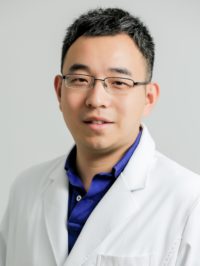
Associate Member
M.D. (Peking University Health Science Center)
Attending Physician, Department of Rehabilitation Medicine, Peking University Third Hospital
Associate Professor, Peking University
Deputy Director, Department of Rehabilitation Medicine, Peking University Third Hospital
Visiting Assistant Professor (2012-2013, ICORD, University of British Columbia)
Research Interests
Autonomic Dysreflexia; Diet; Neuroprotection; Rehabilitation; urodynamicsDr. Liu’s research program encompasses several distinct areas of SCI research. He studies alterations in cardiac autonomic control and cardiovascular response during urodynamics in people with SCI, as well as the effects of cystoscopy on autonomic dysreflexia during urodynamics. In addition, he studies the iatrogenic urological triggers of autonomic dysreflexia, or triggers resulting from health treatments. He also studies the biomechanics of osteoporosis following SCI due to loss of control over the nervous system.
Dr. Liu researches the effectiveness of self-reporting bowel routine questionnaires to determine sacral sparing, or the amount of nerves that survive at the base of the spine, following SCI.
Dr. Liu also studies the approaches to collecting SCI data used by Chinese physicians, in addition to the effectiveness of www.elearnSCI.org and the International Standards for Neurological Classification of Spinal Cord Injury as a training tool for students of nursing and medicine.
Recent collaborations:
Dr. Liu collaborates with Dr. Andrei Krassioukov on studies of autonomic function following SCI.
He also collaborates with Dr. Wolfram Tetzlaff and his team on preclinical studies of the ketogenic diet’s effect on functional recovery following SCI.
In collaboration with the Rick Hansen Institute, Dr. Liu established an SCI registry at Peking University Third Hospital.
Major Findings:
Dr. Liu has reported the high incidence of silent autonomic dysreflexia (AD), or AD with few to no symptoms, during urological procedures, demonstrating the risk of inducing AD through medical treatments. He recommended the routine performance of monitoring of cardiovascular parameters during urodynamics and cystoscopy.
Dr. Liu has developed a self-administered questionnaire for assessment of sacral sparing after SCI based on bowel routine activity.
Techniques employed in the lab:
- Urodynamics
- Electrophysiology
- Immunochemistry
- Histology
- Microscopy
Affiliation with organizations and societies:
- International Spinal Cord Society (ISCoS)
- Education Committee, American Spinal Injury Association (ASIA)
- Autonomic Standards Committee, American Spinal Injury Association (ASIA)
- Editorial Board, Spinal Cord
Current Opportunities in the Lab
Please contact Dr. Liu with inquiries.
Recent Publications
- Liu N, Xing H, Zhou MW, Biering-Sørensen F. Development and validation of a
bowel-routine-based self-report questionnaire for sacral sparing after spinal cord
injury. Spinal Cord. 2017; 55:1010-1015.
- Liu N, Zhou MW, Biering-Sørensen F, Krassioukov AV. Cardiovascular response
during urodynamics in individuals with spinal cord injury. Spinal Cord. 2017;
55:279-284. - Biering-Sørensen F, Biering-Sørensen T, Liu N, Malmqvist L, Wecht JM,
Krassioukov A. Alterations in cardiac autonomic control in spinal cord injury. Auton
Neurosci. 2017 Feb 15.pii: S1566-0702(17)30044-9. doi: 10.1016/j.autneu.2017.02.004. [Epub ahead of print] - Liu N, Zhou M, Biering-Sørensen F, Krassioukov AV. Iatrogenic urological triggers of autonomic dysreflexia: a systematic review. Spinal Cord. 2015; 53:500-9.
- Liu N, Hu ZW, Zhou MW, Biering-Sørensen F. The practice of spinal cord injury
core data collection among Chinese physicians: a survey-based study. Spinal Cord.
Spinal Cord. 2015; 53:658-662.

